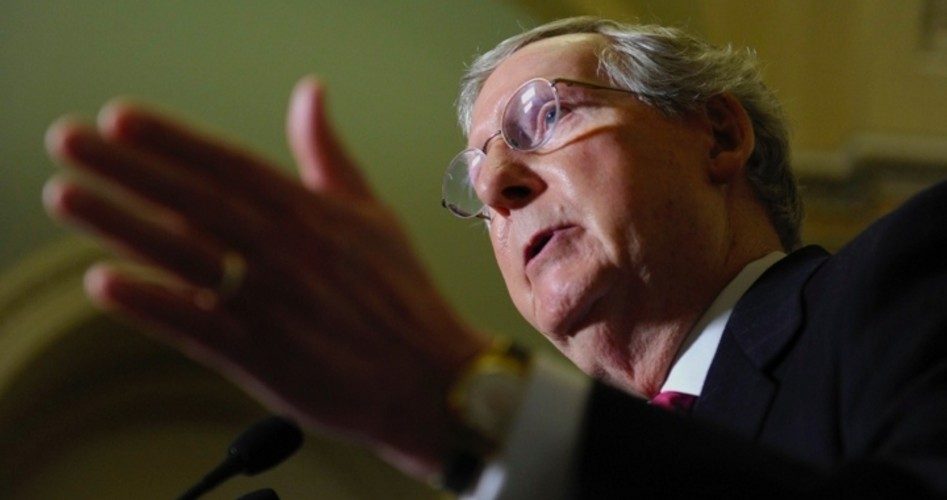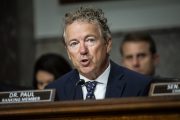
According to the Congressional Budget Office, the U.S. government will reach its borrowing limit in October or November, after exhausting emergency measures to keep the debt below the limit as long as possible. Without the emergency measures, the growing federal debt would hit the ceiling by the middle of this month. But Republicans who had hoped to use the debt ceiling debate as leverage to pass spending cuts were disappointed to learn that Senate Majority Leader Mitch McConnell (shown) has already assured the Dems that the GOP would not threaten a default or government shutdown.
Never mind that neither a default nor a shutdown would be necessary if the federal governent were simply to slash spending and start living within its means.
“The debt ceiling will be handled over a period of months,” McConnell said his appearance on CBS’ Face the Nation Sunday. “I made it very clear after the November election we’re certainly not going to shut down the government or default on the national debt.”
He added that he hoped a debt limit extension “might carry some other important legislation that we can agree on in connection with it.”
Currently, the debt limit stands above $17 trillion, a significant increase from the already high $11.3 trillion when Obama took office.
Many conservatives aknowledge that government spending is the problem and are generally opposed to increasing the borrowing limit without attaching it to spending cuts. However, in the political lexicon of Washington, D.C., “spending cuts” usually mean cuts in future projected increases based on current law, as opposed to cuts in the absolute sense. Thus spending continues to skyrocket even when politicians boast about tightening their fiscal belts.
If spending really were cut to the point where the government spends less money than it collects in taxes, then there would be no need to increase the debt limit. Once this is understood, it becomes clear that tying spending “cuts” to debt ceiling increases is itself a retreat from a fiscally sound position, since it means that the cuts are insufficient to balance the books.
However, as observed by the Washington Times, McConnell’s remarks reflect a “major retreat” from where the Republican Party stood four years ago “when their party took control of the House and forced President Obama into a first round of debt negotiations.”
In August 2011, a standoff over the debt limit prompted the first-ever downgrade of the nation’s credit rating by Standard & Poor’s. Two years later, in October, there was a 16-day partial government shutdown when Democrats and Republicans could not reach a budget agreement. Still, regardless of the big “showdowns” between the two parties, no significant spending cuts have been achieved, which of course is why total federal outlays have continued to go up.
Now, under McConnell’s leadership, the Republican Party appears weaker than ever, failing to take full advantage of its congressional majority to put the brakes on the Washington spendathon.
Earlier this month, Republican efforts to block funding for Obama’s executive action on immigration came to an end when McConnell caved by offeriing Democrats a “clean” funding bill without this prohibition. As a result, House Speaker John Boehner told his colleagues that they were out of options, and the House accepted the bill.
Boehner said at the time, “Unfortunately, the fight was never won in the other chamber. Democrats stayed united and blocked our bill, and our Republican colleagues in the Senate never found a way to win this fight.”
Republicans in the House were demoralized by the loss. One House Republican called it “an unmitigated loss for conservatives.”
But McConnell contends that his actions serve the interests of the American people. “When the American people elected divided government, they’re not saying they don’t want anything done,” he said Sunday. “They’re saying, ‘We want you guys on each side to look for things that you can agree on to make progress in the country.’ And that’s always my first choice.”
Democrats claim that failure to raise the debt ceiling would cause economic devastation. “There is no reason that the Republican Congress should not act immediately to take the prospect of a catastrophic default off of the table,” House Democratic Leader Nancy Pelosi said in a statement. “Failure to act would have savage impacts on American families.”
According to former Republican Congressman Ron Paul, however, such statements are examples of fear-mongering. In 2011, while serving as a congressman for the state of Texas, Paul said, “I never vote for the spending, so I’d hardly want to accommodate the big spenders. We should, you know, live within our means. And you’d be forced to do it that way. And of course … you’ll hear the fear mongers. They’ve already started. ‘The end of the world is coming.’ ”
That same year, Paul wrote a compelling piece outlining precisely why the United States should stop raising the debt ceiling. He concluded:
When our creditors finally wise up and cut us off, we will be forced to face economic realities whether we want to or not. It would be easier to deal with the tough choices we face now, on our own terms, rather than wait until we are at the mercy of foreign creditors. However, leaders in Washington have no political will to admit that we cannot afford to continue spending without any meaningful limit. They prefer maintaining the illusion and putting off reality for another day.
But with leaders such as Obama and McConnell, the debt ceiling will continue to be treated like a suggestion rather than an actual limit. What’s more, at what point is the Republican Party going to realize it cannot continue to assert itself as the fiscally conservative party?
Photo of Sen. Mitch McConnell: AP Images




